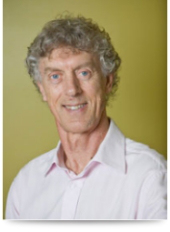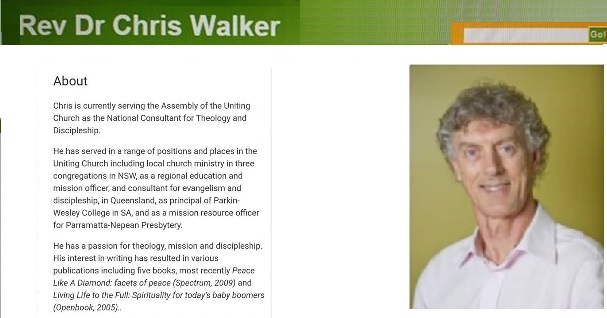with Rev Dr Chris Walker

Christian Hope and Action
The writer of Psalm 42 cries out, “As the deer longs for flowing streams, so my soul longs for you, O God.” He used to be involved in the procession to the house of God but now he is now stricken by illness. He is even taunted by people who say to him continually, “Where is your God?” It seems that God has forgotten him. He goes on to ask, “Why are you cast down, O my soul, and why are you disquieted within me?” He hopes for God and wants God to help him. When difficulties surround us do we turn to God and what do we hope for? What action should we take as well?
The psalmist is suffering some kind of illness which others regard as an indication that God has either sent it or else has forsaken the person. Nevertheless, the psalmist cries out to God hoping for God’s healing and restoration. God’s steadfast love and faithfulness are known to him. He hopes that he shall again be able to praise God for what God has done for him.
Many people cry out to God when faced with significant problems or difficult circumstances. There is nothing wrong with doing so. God as revealed by Jesus is a God who cares deeply for us especially when people are suffering. It is best done out of a relationship with God that knows God’s love and faithfulness.
It has often been the case that the hope held out by Christian preachers and teachers has been for life beyond death. In heaven suffering will come to an end. There will be no more death. Mourning, crying and pain will be no more as John in Revelation 21 presents it.
While life beyond death is an important component of Christian belief, especially in the light of Jesus’ resurrection, it is not the predominant message of Jesus. Jesus spoke of the coming kingdom of God as both already and not yet. He said little about the ‘not yet’ other than to affirm resurrection to eternal life with God. His main focus was on the ‘already’, the breaking in of God’s rule into the present.
One of the main sections of the Lord’s prayer is, “your kingdom come, your will be done, on earth as in heaven.” Here there is affirmation of the kingdom of heaven but the emphasis is on God’s realm coming on earth and God’s will being carried out in the present.
This says to me that while we are to affirm life beyond death and the fullness of God’s kingdom after this life, we are to live by God’s will now. We are to endeavour to make this life more like the final commonwealth of God when suffering will be no more.
God is a God who as Creator cares for all God’s creation but has also given creation and especially humans ‘relative freedom.’ God does not intervene in every situation. If God did so then freedom and responsibility would not be a reality. Freedom is respected by God which means that God places some limits on God’s self in relation to the world and especially humans. Humans can and often do go against what God wants. Fortunately, God is also a loving and merciful God who readily forgives as Jesus indicated. God’s Spirit is at work in the world.
God does not send affliction on people or abandon them when they suffer. People may feel alone in their suffering but God’s Spirit is present and God does want people to know love and healing. Healing does not always happen but that does not mean God does not still care. We live in a world in which there is suffering from sickness, accident and particularly from the actions of others. The latter is in fact usually the worst kind of suffering especially when it has been deliberately inflicted.
At present we see this in the suffering of Palestinians in Gaza. The protests are understandable given the death, injury, destruction and treatment of the Palestinian people. Even humanitarian aid has been restricted and aid workers killed. While Israel claims to be acting to protect itself and root out Hamas fighters, the extent of civilian suffering and displacement is extreme.
The situation in Ukraine is one in which an unnecessary war was initiated by Russia claiming land for itself. The war has been going on for over two years and there is no end in sight as both sides now just hold their positions for the most part. Many people have been killed though nothing like the number of civilians in Gaza. Many people have been displaced and Russia seems to be holding on to the view that if they just keep sending more soldiers that eventually they will win.
God has not intervened. God is no doubt grieved by all the suffering. The hope is in those who are working for cease-fires and an end to the conflicts. Some compromises will no doubt be required. Humans do have the responsibility more than any other creature for the well-being not only of human societies but also for the environment itself.
If we as Christians are to play a role, it is in praying for situations such as these, caring about the suffering of the people, and doing what we can to call for an end to the violence. We want to see justice for all people, not revenge. We desire lasting peace that can only come from both sides in conflict respecting one another and being willing to live together in the future in peace. There are examples of Palestinians and Israelis working together for peace. They can be affirmed, not those who continue to hate and mistreat those regarded as enemies.
We hope against hope for an end to the conflicts in Gaza and Ukraine and pray that God’s Spirit will be listened to in order for peace to be restored and a better future come about for all involved.

Chris Walker
http://revdrchriswalker.wordpress.com/
Chris is currently serving the Assembly of the Uniting Church as the National Consultant for Theology and Discipleship.
He has served in a range of positions and places in the Uniting Church including local church ministry in three congregations in NSW, as a regional education and mission officer, and consultant for evangelism and discipleship, in Queensland, as principal of Parkin-Wesley College in SA, and as a mission resource officer for Parramatta-Nepean Presbytery.
He has a passion for theology, mission and discipleship. His interest in writing has resulted in various publications including five books, most recently Peace Like A Diamond: facets of peace (Spectrum, 2009) and Living Life to the Full: Spirituality for today’s baby boomers (Openbook, 2005).
그리스도인의 희망과 행동
시편 42편의 기자는 “하나님이여 사슴이 흐르는 시냇물을 갈망함 같이 내 영혼이 주를 갈망하나이다”라고 외칩니다. 그는 전에는 하나님의 집으로 가는 행렬에 참여했으나 지금은 병에 걸렸습니다. 심지어 그는 계속해서 “네 하나님이 어디 있느냐?”라고 말하는 사람들로부터 조롱을 받기도 합니다. 하나님께서 그를 잊어버린 것 같습니다. 그는 계속해서 “내 영혼아 네가 어찌하여 낙망하며 어찌하여 내 속에서 불안해 하는가?”라고 묻습니다. 그는 하나님을 바라며 하나님께서 그를 도와주시기를 원합니다. 어려움이 닥칠 때 우리는 하나님께로 향하며 무엇을 바라나요? 우리도 어떤 조치를 취해야 할까요?
시편 기자는 다른 사람들이 하나님이 그 사람을 보내셨거나 그 사람을 버리셨다는 표시로 간주하는 어떤 종류의 질병을 앓고 있습니다. 그럼에도 불구하고 시편 기자는 하나님의 치유와 회복을 바라며 하나님께 부르짖습니다. 그에게는 하나님의 한결같은 사랑과 신실하심이 알려져 있습니다. 그는 하나님께서 그를 위해 행하신 일로 인해 다시 하나님을 찬양할 수 있기를 바랍니다.
많은 사람들이 중대한 문제나 어려운 상황에 직면했을 때 하나님께 부르짖습니다. 그렇게 해도 아무런 문제가 없습니다. 예수님이 계시하신 하나님은 특히 사람들이 고통을 당할 때 우리를 깊이 돌보시는 하나님이십니다. 그것은 하나님의 사랑과 신실하심을 아는 하나님과의 관계에서 가장 잘 이루어집니다.
기독교 설교자들과 교사들이 제시하는 희망은 죽음 너머의 생명에 대한 것인 경우가 종종 있었습니다. 천국에서는 고통이 끝날 것입니다. 더 이상 죽음은 없을 것입니다. 계시록 21장에서 요한이 제시한 것처럼 애통과 울부짖음과 고통은 더 이상 없을 것입니다.
죽음 너머의 삶이 기독교 신앙의 중요한 요소이기는 하지만, 특히 예수님의 부활에 비추어 볼 때, 그것이 예수님의 주된 메시지는 아닙니다. 예수님은 다가오는 하나님 나라에 대해 이미 다가온 것과 아직은 아닌 것으로 말씀하셨습니다. 그는 하나님과 함께하는 영원한 생명으로의 부활을 확언하는 것 외에는 ‘아직’에 대해서는 거의 언급하지 않았습니다. 그의 주요 초점은 ‘이미’, 즉 현재에 하나님의 통치가 임하는 것이었습니다.
주기도문의 주요 부분 중 하나는 “나라이 임하옵시며 뜻이 하늘에서와 같이 땅에서도 이루어지이다” 입니다. 여기에는 천국에 대한 확언이 있지만, 강조점은 하나님의 영역이 이 땅에 임하고 하나님의 뜻이 현재 이루어지고 있다는 것입니다.
이는 우리가 죽음 너머의 삶과 이생 후에는 하나님 나라의 충만함을 확증해야 하지만 지금은 하나님의 뜻에 따라 살아야 한다는 것을 의미합니다. 우리는 고통이 더 이상 없을 때 이 삶을 하나님의 최종 국가와 더욱 비슷하게 만들기 위해 노력해야 합니다.
하나님은 창조주로서 하나님의 모든 피조물을 돌보시지만 피조물, 특히 인간에게 ‘상대적 자유’를 주시는 하나님이십니다. 하나님은 모든 상황에 개입하지 않으십니다. 만약 하나님이 그렇게 했다면 자유와 책임은 현실이 아닐 것입니다. 하나님은 자유를 존중하십니다. 이는 하나님께서 세상, 특히 인간과 관련하여 하나님 자신에게 어느 정도 제한을 두셨다는 것을 의미합니다. 인간은 하나님이 원하시는 것에 반대할 수 있고 종종 그렇게 합니다. 다행스럽게도 하나님은 예수께서 지적하셨듯이 기꺼이 용서하시는 사랑이 많고 자비로운 하나님이십니다. 하나님의 영이 세상에 역사하고 계십니다.
하나님은 사람에게 고난을 보내지 않으시고, 고난을 받을 때 버리지 않으십니다. 사람들은 고통 속에서 외로움을 느낄 수도 있지만, 하나님의 영이 현존하며 하나님은 사람들이 사랑과 치유를 알기를 원하십니다. 치유가 항상 일어나는 것은 아니지만 그렇다고 해서 하나님이 여전히 돌보지 않으신다는 의미는 아닙니다. 우리는 질병, 사고, 특히 타인의 행동으로 인해 고통받는 세상에 살고 있습니다. 후자는 실제로 특히 의도적으로 가해진 고통의 최악의 종류입니다.
현재 우리는 가자 지구의 팔레스타인인들이 겪고 있는 고통에서 이를 봅니다. 팔레스타인 사람들의 죽음, 부상, 파괴, 처우를 고려하면 이번 시위는 이해할 수 있다. 인도주의적 구호 조차 제한됐고 구호요원들이 목숨을 잃었습니다. 이스라엘은 자신을 보호하고 하마스를 근절하기 위해 행동한다고 주장하지만 민간인의 고통과 이주 정도는 극심합니다.
우크라이나 상황은 러시아가 자신들의 영토를 주장하면서 불필요한 전쟁을 시작한 상황입니다. 전쟁은 2년 넘게 계속되고 있으며 이제 양측은 대부분 자신들의 입장을 고수하고 있기 때문에 끝이 보이지 않습니다. 가자 지구의 민간인 수만큼은 아니지만 많은 사람들이 사망했습니다. 많은 사람들이 난민이 되었고 러시아는 계속해서 더 많은 군인을 파견하면 결국 승리할 것이라는 견해를 고수하고 있는 것 같습니다.
하나님은 개입하지 않으셨습니다. 하나님께서는 틀림없이 모든 고난으로 인해 슬퍼하실 것입니다. 휴전과 분쟁 종식을 위해 노력하는 사람들에게 희망이 있습니다. 약간의 타협은 의심할 여지 없이 필요할 것입니다. 인간은 인간 사회의 복지뿐만 아니라 환경 자체에 대해서도 다른 어떤 생물보다 더 큰 책임을 갖고 있습니다.
그리스도인으로서 우리가 해야 할 역할은 이러한 상황을 위해 기도하고, 사람들의 고통에 관심을 갖고, 폭력의 종식을 촉구하기 위해 우리가 할 수 있는 일을 하는 것입니다. 우리는 복수가 아닌 모든 사람을 위한 정의를 보고 싶습니다. 우리는 갈등 속에서 서로를 존중하고 미래에 평화롭게 함께 살기를 원하는 양측에서만 얻을 수 있는 지속적인 평화를 원합니다. 팔레스타인과 이스라엘이 평화를 위해 협력한 사례가 있습니다. 그들은 적으로 간주되는 사람들을 계속해서 미워하고 학대하는 사람들이 아니라 긍정할 수 있습니다.
우리는 가자지구와 우크라이나의 분쟁이 종식되기를 희망하며, 평화가 회복되고 관련된 모든 사람들에게 더 나은 미래가 올 수 있도록 하나님의 성령의 음성이 들릴 수 있도록 기도합니다.
번역 = 크리스천라이프 편집부

